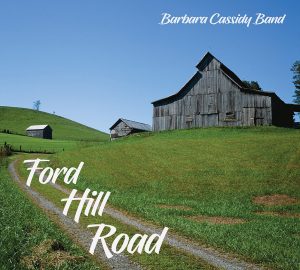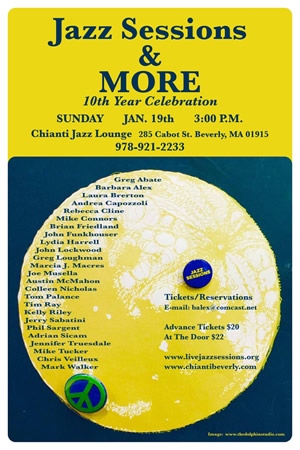 Barbara Cassidy Band’s latest CD Ford Hill Road is a masterwork of expression. Mourning the loss of a relationship can turn many singer-songwriters’ albums into grand works focused on this part of the human experience. With advanced vocal ability and a band of nimble, subtle players backing her, Cassidy makes a huge leap into the terrain of an artist who has truly arrived. With Dan Cardinal mastering tracks at Dimension Sound Studio that Cassidy and her band mate Eric Chasalow recorded at home, the disc percolates with an intimacy and an ambiance that cannot easily be match.
Barbara Cassidy Band’s latest CD Ford Hill Road is a masterwork of expression. Mourning the loss of a relationship can turn many singer-songwriters’ albums into grand works focused on this part of the human experience. With advanced vocal ability and a band of nimble, subtle players backing her, Cassidy makes a huge leap into the terrain of an artist who has truly arrived. With Dan Cardinal mastering tracks at Dimension Sound Studio that Cassidy and her band mate Eric Chasalow recorded at home, the disc percolates with an intimacy and an ambiance that cannot easily be match.
Title track “Ford Hill Road” opens the disc with its wistful reflections on a missing lifestyle by describing a few choice images. Similar to William Carlos Williams’ poem “The Red Wheelbarrow,” the piece captures the imagination by focusing the listener’s attention on a few personal details and these lyrics stand out as much as the music and voice delivering it. Barbara Cassidy’s voice is a blend of instrument and mood. She milks each vocal note for all the feeling they’re worth as she glides over all with a silky smoothness. While bass player Robert Nieske and drummer Mike Piehl give this a gentle pat forward, acoustic guitarist Eric Chasalow picks a sensitive, supportive chord progression as Lyle Brewer picks a quiet but very pretty melody on electric guitar.
A cover of Sandy Denny‘s “By The Time It Gets Dark” gets a plucky, thumpy groove from Nieske and Piehl. Over their smooth bumps of motion sit’s a violin sprawl from Joe Kessler, a weave of mandolin notes from the ubiquitous Jimmy Ryan, a sweeping accordion swirl from Jake Bush, and Chasalow’s acoustic and Brewer’s electric grit. Cassidy knows just how to unfold her peaks and valleys of emotion above this tuft of notes. Not only does her sweet, tender voice grab the ear, she can tell the story with just the emotive qualities she expresses in timbre and tone.
“Sideshow” recalls the circus that came to town during the summers of Cassidy’s youth. Again, her lyrical descriptions capture the scenes and the moods with the force of poetry. Coating her words with her strong, rangy, expressive vocal brings them to three dimensional life. Her band supports her with a lilting violin and according melody, a line charged with a depth of feeling that cries out to be felt as well as heard. Brewer chimes in with his electric melody, adding another layer of soul to this sweet reverie piece.
“Going Away” is a someone leaving someone song that belies its own sad lyrics with a jaunty groove and a host of sparkly notes from the seven piece band supporting Cassidy. Cassidy chirps prettily through images of fall and suggestions of something being over. Her voice is a tender allure as it moves through this mid-tempo work. Tender bowing, delicates picking, and a floating backing vocal from Becky khitrik give the listener another tuft of sound to enjoy beneath the voice.
Down tempo and plaintive, “Please Don’t Go” is a journey through a landscape of loss and sorrow. Cassidy’s voice is a supple instrument as it moves with a flexible thickness through a weave of tender guitars, mandolin, fiddle and also, on this number, a horn section. A wave of horn lines lifts the emotive qualities of this song even higher, and, in another twist, are neatly punctuated by Cassidy’s sharp rhythm section.
For a quiet song, “The Topaz Sky” has a grand sway, though it takes its time unfolding. Cassidy’s voice feels like an ephemeral presence amidst a light touch of mandolin, fiddle, and Eric Chasalow’s forlorn keyboard tinkling. The listener can feel the easeful, peaceful vibe of the vacation spot she once shared with a former lover. Her vocal drawls out all of the wistfulness for what she has lost while pleasing the ear with its susurrant application.
Joshua Relbstein‘s down tempo tube gives a lot of character to Cassidy and Chasalow‘s “It’s Broken.” To hear that big, beautiful, but considerate and measured horn is to be pulled deeper in what Cassidy is doing here. Cassidy and Chasalow present a charming duet as they croon about someone who so set in his or her ways that they don’t know when to toss something that is no longer working. Their threadbare lyrics leave on wondering if they are talking about a broken appliance or a dysfunctional relationship. Their delivery coats their ironic lyrics with warmth and humor. Tasteful fiddle and nimble electric guitar picking heighten the whimsy, and the backing players help make this a winsome tune.
Gentle and light, “Lullaby” is sung in much the style the title suggests. Cassidy’s sensitive rendering of this genre brings it to a higher level, of course, and she successfully turns into grist for a singer-songwriter format. She gives just the right amount of voice in the space above a tender mandolin played by Eric Chasalow.
Covering the folk standard “Miss The Mississippi And You,” Cassidy and company recreate the slow, drawling lifestyle in that hot climate as well as the heart spun feeling many have there for their home town life along the river. A four part horn section captures the romanticized notions we all have for that land of Mark Twain and riverboats. Meanwhile, Cassidy’s vocal techniques here include a pretty yodel as well as her usual high ability to heighten the meaning of any song with her careful phrasing through sensitive lyrics.
“Long Gone” finds Cassidy using some tender vocal sustains as she sails alongside a mournful fiddle. She pulls greater feeling out of this work by finessing key words thusly. No other singer has ever made the word “gone” feel so sad and final. Underneath this vocal line lies the other half of this song’s bittersweet beauty. It’s the adept backing bad that brings in a lilting accordion line, a plucky acoustic bass, and plenty of other moody notes that feel like goodbye.
“Awake And Crazy” gets a nice bouncy push from Cassidy’s nimble rhythm section. Over that fun groove Dave Limina’s Hammond B3 spreads a soulful organ line and Joe Kessler’s fiddle makes things nice and pretty. A flinty build up among the guitars and mandolin become the heartbeat of this likable piece as Cassidy spreads her wings and swoops over everything with a touch of catchy pop.
Sung-spoken, the easeful “Taking Back My Kisses” is a witty story song. Cassidy describes going through the motions of divorce, like returning things before making kisses a metaphor for something deeper than those marital possessions. This quaint ditty succeeds on the strength of Cassidy’s carefully delivered lyrics as they pass over tinkles of notes from her sensitive players.
Cassidy and Chaslow team up as songwriters on “I Like It,” a tune with a swing beat and a jazzy horn section. One is transported back to the 1920s when many love songs played out in this joyous expression of melody and with an exuberance in the groove. Fiddle and guitars make jaunty appearances here too and all carry this romantic duet quiet well.
Close out song “Your Careless Heart” makes its point with bittersweet aplomb and finishes quickly, a tender wrap up of this album’s theme of heartbreak and longing as well as a polite goodbye for now to Cassidy’s fans.
Cassidy and her musical friends have created a dandy of an album. Ford Hill Road is a mournfully beautiful expression of the loss of something essential and the longing for it to return in some kind of way. The songwriting is sensitive and honest. The vocal work and the musicianship never fail to leave a strong impression on the listener. Ford Hill Road takes one woman’s sorrowful journey and turns it into a universal experience that all can relate to. Bravo.

